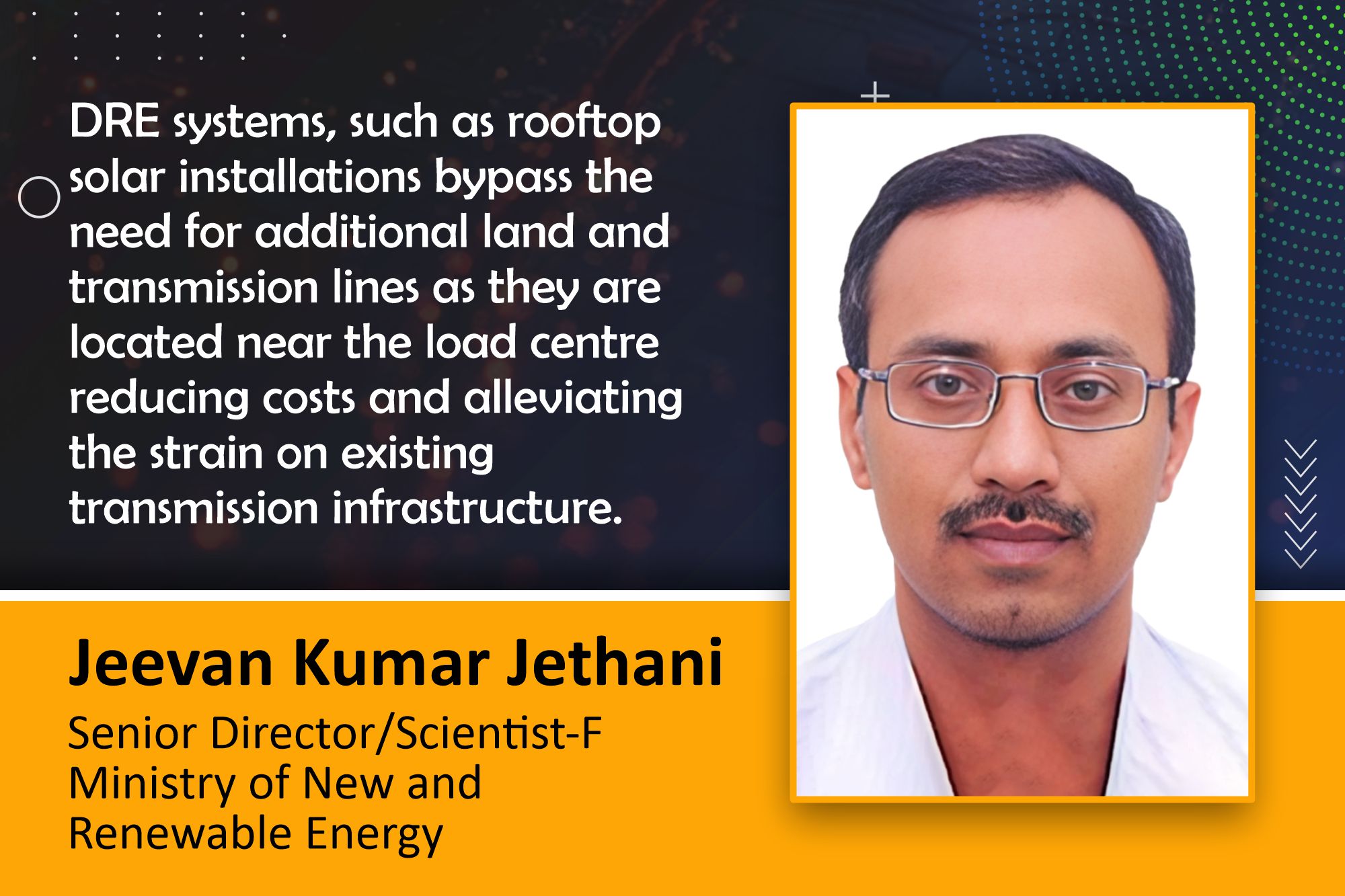DRE is a sustainable solution for the energy needs of India
By EPR Magazine Editorial January 27, 2025 5:18 pm IST
By EPR Magazine Editorial January 27, 2025 5:18 pm IST

Decentralised Renewable Energy (DRE) is an essential pillar for addressing India’s energy needs, bridging the gap between energy supply and demand, and ensuring sustainable development. Unlike conventional centralised energy systems, DRE brings power generation closer to the point of consumption, reducing costs, transmission losses, and dependency on large-scale infrastructure. This localised approach supports the country’s transition to renewable energy and contributes to the upliftment of rural and underdeveloped regions.
One of the primary benefits of DRE lies in its efficiency and cost-effectiveness. Centralised renewable energy systems require vast land and extensive transmission infrastructure, which add significant costs. While these transmission costs are often overlooked, they can amount to ₹2-3 per unit of energy. DRE systems, such as rooftop solar installations, bypass the need for additional land and transmission lines as they are located near the load centre. This reduces costs and alleviates the strain on existing transmission infrastructure. As energy demand increases, DRE can provide a scalable and flexible solution to meet localised energy requirements without significant investments in infrastructure.
India’s energy consumption per capita is just 1,250–1,300 kWh, about one-third of the global average. This figure is even lower in certain states and regions, such as the Northeast, where per capita consumption is just 100 units. Energy consumption is a critical indicator of development, with higher electricity usage strongly correlating with a better Human Development Index (HDI). Thus, improving energy access through DRE can significantly upgrade living standards and enable economic growth, especially in rural and underserved areas.
DRE also fosters greater energy equity by empowering individuals and communities. For instance, rooftop solar installations can drastically reduce electricity bills, encouraging households to adopt energy-intensive appliances and improve their quality of life. Government schemes like PM Surya Ghar and PM KUSUM are pivotal in promoting DRE adoption. Under the PM Surya Ghar scheme, individuals can receive up to 60 percent central financial assistance (CFA) for the first 2 kW of rooftop solar installations and 40 percent for the next kW.
Households in special category states such as Jammu & Kashmir, Ladakh, and the Northeast receive an additional 10 percent subsidy. Furthermore, group housing societies are also eligible for this subsidy, expanding the scheme’s reach. Similarly, the PM KUSUM scheme focuses on solarising agriculture, accounting for 18 percent of India’s electricity consumption. The PM Kusum scheme enables solarised grid-connected pumps, reducing dependency on conventional electricity. Additionally, feeder-level solarisation is encouraged, wherein small or medium-sized solar power plants are installed near agricultural feeders. Subsidies of ₹1.05 crore per MW make this initiative financially attractive for stakeholders, paving the way for sustainable agricultural energy use.
The transition to renewable energy also presents challenges, particularly in integrating intermittent sources like solar and wind into the grid. Energy storage solutions, such as batteries or pumped storage systems, are essential to ensure a stable and reliable energy supply. While centralised storage systems are feasible, decentralised storage near load centres is more efficient and practical, especially for rural and remote areas. Decentralised battery systems can provide uninterrupted power during peak demand and adverse weather conditions, enhancing energy security.While India has implemented several policies to promote DRE, regulatory bottlenecks and consumer awareness remain significant hurdles. For instance, Discoms often perceive DRE as threatening their revenue, leading to unfavourable policies or higher tariffs. However, steps are being taken to address these challenges. The Forum of Regulators has formed a working group on renewable energy to develop model regulations and promote DRE adoption. This platform facilitates stakeholder discussions to resolve policy issues and streamline implementation processes.
As energy demand grows, achieving sustainable energy access will require a balanced approach combining centralised and decentralised systems. DRE has the potential to complement large-scale renewable energy projects by reducing costs, enhancing grid resilience, and providing localised energy solutions.
We use cookies to personalize your experience. By continuing to visit this website you agree to our Terms & Conditions, Privacy Policy and Cookie Policy.